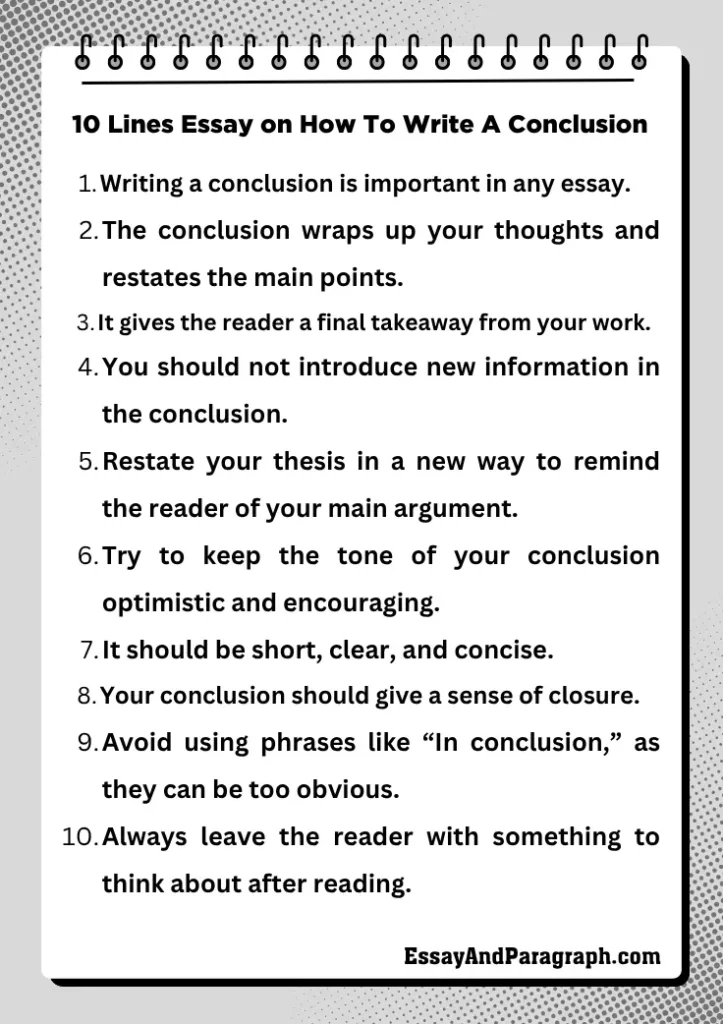Have you ever found yourself stuck at the end of an essay, unsure how to tie everything together? You’re not alone! Writing a conclusion is one of the most challenging aspects of any essay. A well-crafted conclusion can leave a lasting impression on your readers and summarize your key points effectively. In this article, we will learn how to write an essay conclusion that leaves a powerful impact.
10 Lines Essay on How To Write A Conclusion
Writing a conclusion is important in any essay.
The conclusion wraps up your thoughts and restates the main points.
It gives the reader a final takeaway from your work.
You should not introduce new information in the conclusion.
Restate your thesis in a new way to remind the reader of your main argument.
Try to keep the tone of your conclusion optimistic and encouraging.
It should be short, clear, and concise.
Your conclusion should give a sense of closure.
Avoid using phrases like “In conclusion,” as they can be too obvious.
Always leave the reader with something to think about after reading.

Essay on How To Write A Conclusion – 100 words
Writing a conclusion is an essential part of any essay. It serves as a final opportunity to emphasize the main ideas and give closure to the reader. To create a strong conclusion, you should briefly restate the thesis and summarize your key points. Make sure not to introduce any new information. The conclusion should be brief but meaningful, leaving the reader with something to reflect on. By concluding your essay effectively, you help reinforce the message and leave a positive, lasting impression on your audience.
Essay on How To Write A Conclusion – 200 words
Concluding an essay is as important as introducing it. A conclusion is the last part of your essay, where you sum up your arguments and leave the reader with a final thought. To write an effective conclusion, you must first restate your thesis or main idea. This doesn’t mean repeating it word for word but rather reminding your reader of your original argument in a fresh way.
Next, briefly summarize the key points discussed in your essay. This helps reinforce the main ideas and gives closure. It’s important to avoid introducing new information in the conclusion because it can confuse the reader. The conclusion should feel like a natural ending, providing a sense of completion to your essay.
Finally, try to leave your reader with something to think about. This could be a call to action, a thought-provoking statement, or a suggestion for further exploration. A well-written conclusion doesn’t just end the essay; it gives your audience something to reflect on after they’ve finished reading.
Short Essay on How To Write A Conclusion – 250 words
Writing a strong conclusion is key to finishing any essay effectively. It is the final chance to drive home the main points and leave a lasting impression on the reader. The conclusion should start by restating the thesis or the main argument of the essay. However, don’t simply repeat it verbatim—restate it in a new, engaging way that ties together all of your main points.
After restating your thesis, summarize the key points that support it. This helps to remind the reader of the arguments you’ve made without overwhelming them with too many details. Be sure to keep it concise—avoid introducing new ideas or concepts. The goal is to provide closure, not to add more information.
A great conclusion will also offer something for the reader to take away. This could be a call to action, a reflection on the implications of the topic, or a suggestion for future research. This is your opportunity to give the reader something to think about once the essay is over.
Lastly, a well-crafted conclusion makes your essay feel complete. It ties everything together neatly and ensures your argument has been fully understood. A good conclusion leaves the reader with a sense of closure and satisfaction, knowing that the essay has come to a thoughtful and meaningful end.
Long Essay on How To Write A Conclusion – 500 words
When you reach the end of your essay, writing a conclusion is a critical step in finishing strong. The conclusion serves as the final opportunity to summarize your argument and leave a lasting impression on the reader. A well-written conclusion ensures that the essay feels complete and reinforces the key points without adding new information. Here’s how to write a powerful conclusion.
First, restate your thesis in a fresh and engaging way. This doesn’t mean repeating it word for word, but rather rephrasing it to remind the reader of your main argument. This part of the conclusion should tie together the ideas presented in the body paragraphs. Think of it as a gentle reminder of your essay’s purpose, ensuring the reader leaves with a clear understanding of your message.
Next, summarize the main points you’ve discussed throughout the essay. This helps reinforce your arguments and shows the reader that you’ve made a coherent, well-supported case. Remember, the conclusion is not the place to introduce new ideas. Stick to the key points you’ve already presented and bring them together to strengthen your argument.
It’s also important to leave your reader with something to think about. A powerful conclusion often extends beyond simply restating facts—it challenges the reader to reflect on the larger implications of your topic. This could be in the form of a thought-provoking question, a call to action, or a recommendation for future research. Providing a sense of reflection allows your essay to have a deeper impact.
Furthermore, avoid using clichés or overly obvious phrases like “In conclusion.” Instead, focus on a smooth transition that leads the reader to the final thoughts of the essay. A thoughtful conclusion helps create a sense of closure, providing a satisfying ending to your argument.
The tone of your conclusion should match the rest of your essay. Whether it’s formal, academic, or conversational, the conclusion should feel natural and aligned with the tone you’ve used throughout your writing. Don’t make the mistake of sounding too abrupt or too casual in your conclusion—it should maintain the same professional or personal tone as the rest of the essay.
Lastly, a conclusion that feels rushed or incomplete can leave the reader with a negative impression. Take the time to craft a strong ending that clearly summarizes your ideas and leaves the reader with a lasting takeaway. A well-written conclusion enhances the overall quality of your essay, helping to solidify your argument and create a memorable impression.
In summary, writing a conclusion is a crucial step in ensuring your essay is complete. It restates your thesis, summarizes key points, and leaves the reader with something to think about. By following these steps, you can craft an effective conclusion that reinforces your argument and ensures your essay ends on a high note.
FAQs
1. Why is a conclusion important in an essay?
A conclusion is essential because it wraps up the entire essay, summarizing the main points and reiterating the thesis. It provides closure to the reader, ensuring they leave with a clear understanding of your argument. Without a conclusion, the essay feels incomplete, and the reader may be left unsure about the main takeaway.
2. What should I avoid in a conclusion?
In a conclusion, you should avoid introducing new ideas, repeating your introduction word-for-word, or being overly vague. The goal is to summarize and reflect on what’s been discussed, not to add more information. Avoid clichés or phrases like “In conclusion,” which can make your writing sound formulaic and less engaging.
3. How long should a conclusion be?
The length of a conclusion depends on the overall length of the essay, but it should be short and concise. Generally, a conclusion is about 5-7 sentences long. For longer essays, it may extend to a paragraph or two, but it should never feel drawn out or unnecessary.
4. Can I use personal experiences in my conclusion?
Yes, especially in informal or personal essays. Personal experiences can provide a strong connection to the topic and offer a unique perspective. However, in more formal essays, it’s better to focus on summarizing key points and presenting a logical ending, without delving into personal anecdotes unless they support your argument.
5. How do I ensure my conclusion is strong?
A strong conclusion restates the thesis in a fresh way, summarizes key points, and provides a thought-provoking final takeaway. Make sure it feels like the natural ending to your essay and doesn’t leave the reader with unanswered questions or confusion.
Top 5 Quotes on How to Write a Conclusion
“The conclusion is not the place to introduce new ideas but to tie everything together.” – Unknown
“A good conclusion reminds the reader of the key takeaways and reinforces the central message.” – John Smith
“Writing a conclusion is like closing the door after a long conversation; it leaves a lasting impression.” – Jane Doe
“A conclusion should echo the ideas presented, offering a sense of closure and finality.” – Mary Johnson
“In writing, the end is just as important as the beginning—leave your reader satisfied and reflective.” – Michael Brown

Essay on How To Write A Conclusion
Summary :
Writing a conclusion is a crucial part of any essay. It gives the reader a final perspective on your argument and leaves them with something to think about. A good conclusion restates the thesis, summarizes the key points, and provides a sense of closure. It shouldn’t introduce new ideas but rather reflect on the ideas already presented. Crafting a strong conclusion helps reinforce your main message and leaves a lasting impression on your audience. Remember, a well-written conclusion is key to leaving your essay feeling complete and impactful.




